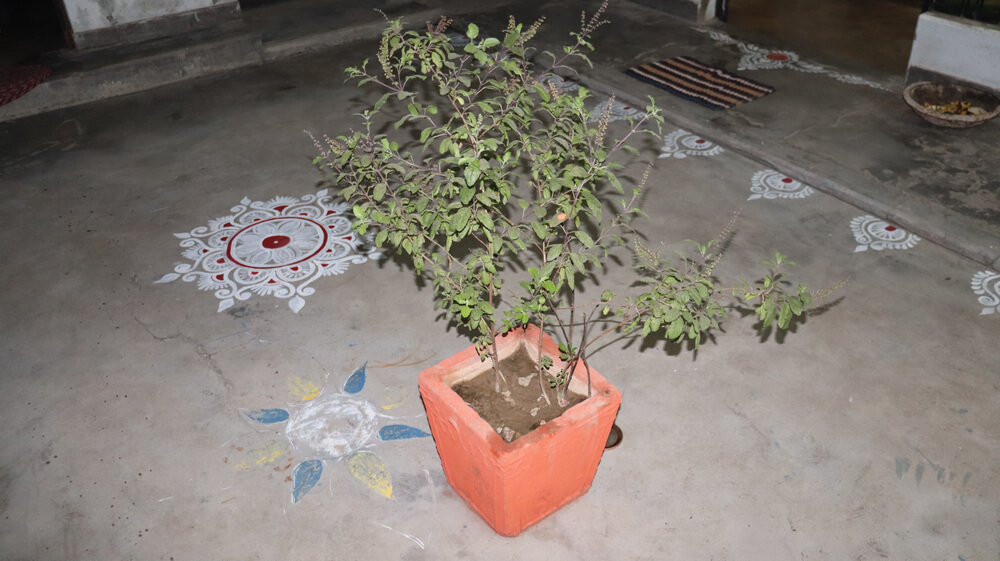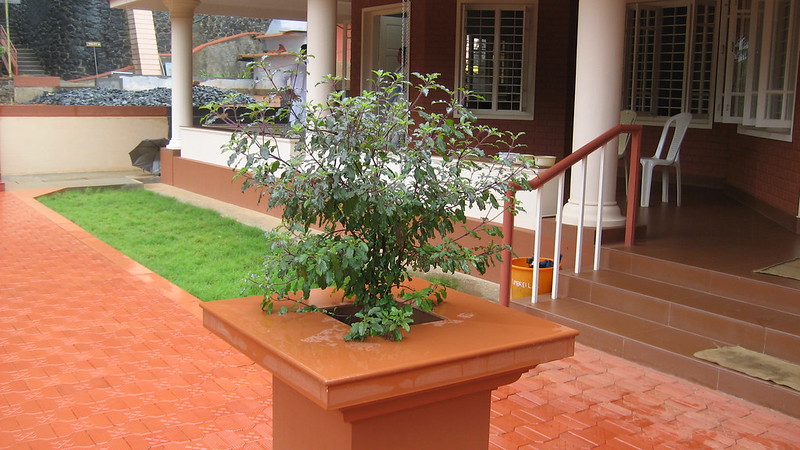Tulsi Plant | Vastu Advantages | Growth Tips | Vastu Shastra | Devotion | Vastu-Friendly | FAQs
The Tulsi plant is a sacred Indian plant used for centuries to protect homes and families. The Tulsi plant is considered to be a powerful natural detoxifier and healer. Keep reading to know more!
Tulsi is a revered plant in India known for its healing properties. Based on the principles of Vastu Shastra, we’ll be looking at some of the best ways to use tulsi plants in your home. In addition, the Tulsi plant is known to promote peace and tranquillity.
Following these tips ensures that your home is balanced and more conducive to happiness and well-being.
Vastu-friendly Tulsi Plant

When it comes to plants in your home, few are as sacred as the Tulsi plant. The Tulsi plant is associated with many Hindu and Buddhist ceremonies and symbols, and the Tulsi plant is a powerful presence in both spiritual and practical ways.
Here are some tips on how to take advantage of this power in your home:
- If you want to create an auspicious atmosphere in your home, consider adding a Tulsi plant to your corner or main space. This gentle, fragrant flower can help increase energy and clarity of thought.
- Another great way to use Tulsi plants in your home is as an air purifier. The plant’s natural oils and properties can help cleanse and deodorize spaces.
- Finally, adding a Tulsi plant into your life can be incredibly beneficial if you’re struggling with anxiety or stress. The calming properties of the plant can help improve moods and create a sense of peace and calmness in any environment.
Vastu Advantages of keeping a Tulsi plant in the house
The Tulsi plant, also known as Indian Sage, has many benefits that can be enjoyed in the home. Here are just a few:
- Tulsi is a natural air purifier. In addition, the oils it produces help to keep dust away from the respiratory system.
- It is believed that keeping a Tulsi plant in the home protects people from bad luck and negative energy.
- The Tulsi plant is also said to have healing properties, which can be used for minor ailments such as headaches and colds.
Tulsi plant care and growth tips
Housewives all over India swear by the sacred tulsi plant. Tulsi is believed to enhance prosperity and good luck and is widely used in religious ceremonies. Tulsi can be added to any room to bring peace, calm, and serenity. Here are some tips on growing and using tulsi plants in your home –
- Choose a spot for your tulsi plant with plenty of sunlight and fresh air. Keep the soil moist but not wet since this will encourage the growth of healthy roots.
- Plant the tulsi in an east or south-facing window, where the sun will shine directly throughout the day.
- Harvest tulsi leaves regularly during the flowering season, starting in early spring and continuing until late summer. Make sure to cut off the flower stem before harvesting, which will help preserve the plant’s potency.
- Store fresh tulsi leaves in a cool place away from direct light or heat, like an attic or basement. They will last for up to two weeks.
Where should a Tulsi plant be placed, according to Vastu Shastra?
Some general guidelines per Vastu Shastra that can help you include a Tulsi plant in your home are to place it near the front door or window, in an area with good airflow and light, and near a water source
The main door is the most crucial entrance into your home and should be accorded the highest respect. If Tulsi is near the door, it will tend to block energy and good fortune from entering your home. Instead, keep Tulsi in an area near windows or doors that open onto a sunny patio or garden. Additionally, Tulsi plants are said to be beneficial for keeping negative energy away from home. It is also beneficial to place one near an area where bad things have happened.
Using a Tulsi plant at home as a means of devotion
The Tulsi (Ocimum tenuiflorum) is revered as a holy plant in Hinduism and Buddhism. It has been used for centuries to promote meditation, contemplation and tranquillity. Tulsi is also known for its healing properties and is thought to improve air quality and circulation. If you want to add some devotion to your home, consider planting a tulsi plant.
Vastu-friendly Tulsi plant: what to do and what to avoid

If you have a Tulsi plant in your home, it is very auspicious. Tulsi is a holy plant in Hinduism and one of the most famous symbols of Hinduism. It has many health benefits, such as purifying the air and reducing stress. Here are some ‘dos and don’ts’ to know about keeping a Tulsi plant in your home:
- Keep Tulsi away from drafts – drafts can cause the leaves to droop. Try to place it near an open window or door to allow fresh air to flow through it.
- Avoid Tulsi near fires – Avoid placing Tulsi near fireplaces or other places where heat may be intense. The leaves may scorch or fall off.
- Do not water it excessively – over-watering can cause the soil to dry and crack, leading to the plant’s death. Try to water it only when the soil is really dry.
- Do not trim its leaves – doing so can damage the plant’s roots and reduce its vigor. Instead, try to gently pull out any dead leaves or branches using a gentle touch.
Summing-up
When it comes to understanding Vastu Shastra, Tulsi is a particular plant.
FAQs
Q: How to pray to Tulsi plants?
Tulsi is a revered plant in Hinduism and is considered to be a holy plant. It is said that Tulsi plants have the power to purify your environment and help you achieve peace and prosperity. If you are looking for guidance on how to care for your tulsi plants, consult a qualified expert. They will be able to provide you with specific instructions on how to treat and nurture your plants.
Q: Does a tulsi plant need direct sunshine to thrive??
A tulsi plant (Ocimum tenuiflorum) is a sacred plant in Hinduism and is often thought to have Ayurvedic properties. Tulsi is also commonly grown as an ornamental flower in gardens.
Most tulsi plants grown in homes do not require direct sunlight to thrive, but some, such as the tulsi bred for the religious purposes of puja (worship), may need slightly more light than other varieties. If you’re unsure whether your tulsi needs direct sunlight, place a sunflower seed next to it and watch which one grows taller. If the sunflower seed grows faster, your tulsi probably needs more light.
